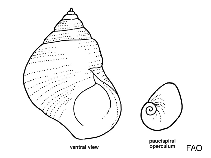Littorina keenae Rosewater, 1978
Eroded periwinkle| Native range | All suitable habitat | Point map | Year 2050 |

|
| This map was computer-generated and has not yet been reviewed. |
| Littorina keenae AquaMaps Data sources: GBIF OBIS |
Upload your photos
Google image | No image available for this species;
drawing shows typical species in Littorinidae.
Google image | No image available for this species;
drawing shows typical species in Littorinidae.
Classification / Names Common names | Synonyms | CoL | ITIS | WoRMS
Gastropoda | Littorinimorpha | Littorinidae
Environment: milieu / climate zone / depth range / distribution range Ecology
Benthic. Subtropical
Distribution Countries | FAO areas | Ecosystems | Occurrences | Introductions
Eastern Pacific: USA to Mexico.
Length at first maturity / Size / Weight / Age
Maturity: Lm ? range ? - ? cmCommon length : 2.0 cm SHL male/unsexed; (Ref. 312)
Short description Morphology
Shell has 2 whorls, and is usually eroded at tip. Purplish brown with faint white markings and a white band on the edge of the shell's mouth; smooth, flat surface next to opening. It is an important source of erosion of high intertidal cliffs (Ref. 312).
It has a shell length of 2 cm long (Ref. 312). Found in the splash and high intertidal zones. Scrapes films of diatoms, blue-green algae and green algae off rocks. When not feeding or crawling, it prevents water loss by secreting a mucous film to attach its foot to surfaces. The mucous seal and operculum (trap door), which snugly fits into the shell, are so effective that they remain alive for two or three months without being submerged under water. They need only to get their gills wet from the water's spray (Ref. 312).
Life cycle and mating behavior Maturity | Reproduction | Spawning | Eggs | Fecundity | Larvae
Members of the order Neotaenioglossa are mostly gonochoric and broadcast spawners. Life cycle: Embryos develop into planktonic trocophore larvae and later into juvenile veligers before becoming fully grown adults.
Main reference
References | Coordinator | Collaborators
Gallivan, G. and J. Danforth. 1999. (Ref. 312)
IUCN Red List Status
(Ref. 130435: Version 2024-2)
CITES status (Ref. 108899)
Not Evaluated
CMS (Ref. 116361)
Not Evaluated
Threat to humans
Human uses
| FishSource |
Tools
More information
Trophic Ecology
Ecology
Population dynamics
Growth
Max. ages / sizes
Length-weight rel.
Length-length rel.
Length-frequencies
Mass conversion
Recruitment
Abundance
Max. ages / sizes
Length-weight rel.
Length-length rel.
Length-frequencies
Mass conversion
Recruitment
Abundance
Life cycle
Distribution
Human Related
Aquaculture profiles
Stamps, coins, misc.
Stamps, coins, misc.
Outreach
References
Internet sources
BHL | BOLD Systems | CISTI | DiscoverLife | FAO(Publication : search) | Fishipedia | GenBank (genome, nucleotide) | GloBI | Gomexsi | Google Books | Google Scholar | Google | PubMed | Tree of Life | Wikipedia (Go, Search) | Zoological Record
Estimates based on models
Preferred temperature
(Ref. 115969): 9.3 - 24.6, mean 11.2 (based on 223 cells).



